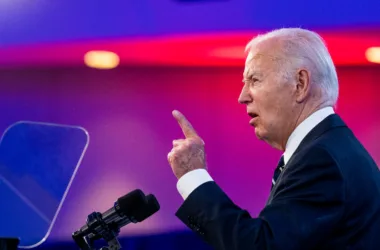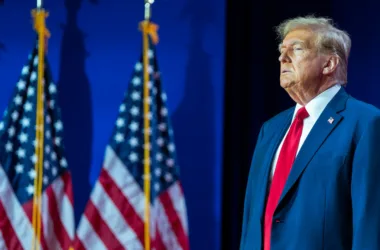The Consumer Financial Protection Bureau, Sen. Elizabeth Warren’s brainchild, fought for its life Tuesday at the Supreme Court, arguing there’s nothing unusual about Congress giving the Wall Street regulatory agency the power to set its own budget without having to ask lawmakers for money each year.
The case serves up big questions about Congress‘ power of the purse and how much of that power lawmakers can give away to the president.
A ruling against the CFPB could have major ramifications, potentially unraveling a decade’s worth of agency decisions. Some legal analysts say it could threaten the foundation of other major agencies such as the Federal Reserve.
Many of the justices seemed wary of going down that path, with several of the Republican appointees siding with the three Democratic appointees in suggesting the CFPB falls squarely within the kind of thing Congress has done since the founding.
“You’re just flying in the face of 250 years of history,” Justice Elana Kagan, an Obama appointee, told the challengers.
The CFPB was created after the 2008 Great Recession as a consumer-focused regulator of banks and other financial institutions. Ms. Warren, then a Harvard University law professor, envisioned a body independent of political pressures.
A Democrat-controlled Congress and a Democratic president crafted the agency to have a single director who couldn’t be fired at will and who could set the agency’s budget by taking money from the Federal Reserve, as long as it didn’t exceed $600 million.
The Supreme Court has already overturned the CFPB’s firing limits, but opponents say the power to set its own budget also tramples on the Constitution.
“This case is about checks and balances,” said Noel Francisco, the lawyer for the Community Financial Services Association of America that brought the case, challenging a 2017 decision the CFPB made imposing new limits on payday lenders.
Solicitor General Elizabeth Prelogar, defending the CFPB, said the agency is well within the historical norm for how Congress has used its spending power.
She pointed to the Federal Reserve, the Federal Deposit Insurance Corp., the Farm Credit Administration and the Comptroller of the Currency as agencies that enjoy budget independence, and the U.S. Postal Service and U.S. Mint, whose budgets are set by how much money they can earn.
She said the first Congress confronted this same issue when it allowed the Customs Service to be funded to the extent it needed through the revenue it collected.
“This is nothing new or unprecedented,” Ms. Prelogar said.
That argument hit home with a number of the justices, who worried about what would have to be unraveled if the court ruled against the CFPB.
“It sure seems in your view that the Federal Reserve would also be unconstitutional,” Justice Elana Kagan told Mr. Francisco.
But he said the CFPB presents a new mix of elements, with perpetual independent budget authority not linked to its own regulatory activities.
“Congress has not determined the amount that this agency should be spending. Instead, it has delegated to the director the authority to pick his own appropriation,” Mr. Francisco said.
He said that sets it apart from the Customs Service, whose funding came from its enforcement activities and which reported to the Treasury Department, which did have a budget set by Congress.
The case centered on what the power of the purse is.
That power comes from Article I, Section 9, Clause 7 of the Constitution: “No Money shall be drawn from the Treasury, but in Consequence of Appropriations made by Law; and a regular Statement and Account of the Receipts and Expenditures of all public Money shall be published from time to time.”
Justice Ketanji Brown Jackson said there are two competing ways of interpreting that. One would mean the founders intended Congress to be exacting in its funding for programs, with specific directions for what is to be spent. But, she said, it could also mean Congress has a broad power to decide how a program is funded and can do that however it wants.
If that means a perpetual funding source with only weak limits, that would fit that vision, she said.
Mr. Francisco said it’s unthinkable that’s what the founders intended, since they wanted Congress‘ power of the purse to be a check on the president’s power.
“If you step back and understand that the Appropriations Clause is meant to separate the power of the sword from the purse, then it has to be a starting point that Congress can’t simply say to the executive, you pick the amount,” he said. “Which is why I think when you look at this language, at a minimum Congress has to pick the amount.
Justice Brett M. Kavanaugh, a Trump appointee, pointed out that Congress can always come back and change the agency’s funding structure any time it wants.
“Congress could change it tomorrow and there’s nothing perpetual or permanent about this,” he said.
Mr. Francisco, though, argued that the underlying principle must be established that Congress can’t give away this sort of power.
“Once you give up power to another agency, you’ve flipped the baseline for getting it back,” he said.
“This case is about checks and balances,” said Noel Francisco, the lawyer for the Community Financial Services Association of America that brought the case, challenging a 2017 decision the CFPB made imposing new limits on payday lenders.
Solicitor General Elizabeth Prelogar, defending the CFPB, said the agency is well within the historical norm for how Congress has used its spending power.
She pointed to the Federal Reserve, the Federal Deposit Insurance Corp., the Farm Credit Administration and the Comptroller of the Currency as agencies that enjoy budget independence, and the U.S. Postal Service and U.S. Mint, whose budgets are set by how much money they can earn.
She said the first Congress confronted this same issue when it allowed the Customs Service to be funded to the extent it needed through the revenue it collected.
“This is nothing new or unprecedented,” Ms. Prelogar said.
That argument hit home with a number of the justices, who worried about what would have to be unraveled if the court ruled against the CFPB.
“It sure seems in your view that the Federal Reserve would also be unconstitutional,” Justice Elana Kagan told Mr. Francisco.
But he said the CFPB presents a new mix of elements, with perpetual independent budget authority not linked to its own regulatory activities.
“Congress has not determined the amount that this agency should be spending. Instead, it has delegated to the director the authority to pick his own appropriation,” Mr. Francisco said.
He said that sets it apart from the Customs Service, whose funding came from its enforcement activities and which reported to the Treasury Department, which did have a budget set by Congress.
The case centered on what the power of the purse is.
That power comes from Article I, Section 9, Clause 7 of the Constitution: “No Money shall be drawn from the Treasury, but in Consequence of Appropriations made by Law; and a regular Statement and Account of the Receipts and Expenditures of all public Money shall be published from time to time.”
Justice Ketanji Brown Jackson said there are two competing ways of interpreting that. One would mean the founders intended Congress to be exacting in its funding for programs, with specific directions for what is to be spent. But, she said, it could also mean Congress has a broad power to decide how a program is funded and can do that however it wants.
If that means a perpetual funding source with only weak limits, that would fit that vision, she said.
Mr. Francisco said it’s unthinkable that’s what the founders intended, since they wanted Congress‘ power of the purse to be a check on the president’s power.
“If you step back and understand that the Appropriations Clause is meant to separate the power of the sword from the purse, then it has to be a starting point that Congress can’t simply say to the executive, you pick the amount,” he said. “Which is why I think when you look at this language, at a minimum Congress has to pick the amount.
Justice Brett M. Kavanaugh, a Trump appointee, pointed out that Congress can always come back and change the agency’s funding structure any time it wants.
“Congress could change it tomorrow and there’s nothing perpetual or permanent about this,” he said.
Mr. Francisco, though, argued that the underlying principle must be established that Congress can’t give away this sort of power.
“Once you give up power to another agency, you’ve flipped the baseline for getting it back,” he said.









